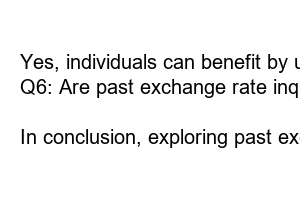과거 환율조회
Title: A Beginner’s Guide to Past Exchange Rate Inquiry: Unveiling the Secrets of International Currency Valuations
Introduction:
Have you ever wondered how currencies fluctuate in value against one another? Understanding past exchange rates and their inquiry can shed light on the fascinating world of global currency fluctuations. In this informative blog post, we will delve into the intricacies of exchange rates, exploring how they impact economic systems and offering insights into conducting past exchange rate inquiries.
1. What is an Exchange Rate?
An exchange rate refers to the value at which one currency can be exchanged for another. It determines the purchasing power of one currency against another in the global marketplace.
2. The Role of Exchange Rates in International Trade:
Exchange rates play a crucial role in the dynamics of international trade. They influence the competitiveness of export and import businesses, as well as the cost of travel and tourism. Understanding past exchange rates enables businesses and individuals to make informed decisions and adapt to fluctuating market conditions.
3. Factors Influencing Exchange Rates:
Exchange rates are influenced by various factors, including interest rates, inflation rates, political stability, economic growth, and market speculation. By studying historical data, one can gain insights into these factors, identify patterns, and anticipate future trends.
4. The Importance of Past Exchange Rate Inquiry:
Past exchange rate inquiries provide valuable historical data, enabling economists, researchers, and investors to analyze trends, identify correlations, and make informed predictions. Whether you’re a business owner planning market entry or an investor diversifying your portfolio, understanding past exchange rates is essential.
5. Methods and Tools for Past Exchange Rate Inquiry:
To conduct a past exchange rate inquiry, one can utilize historical exchange rate databases, economic indicators, and online platforms that provide interactive charts and graphs. These resources allow users to observe the performance of different currencies over time and draw meaningful conclusions.
6. Benefits of Conducting a Past Exchange Rate Inquiry:
By analyzing past exchange rates, individuals and businesses can gauge the economic stability of different countries, determine the risk associated with currency investments, and plan for potential currency fluctuations. This information can inform strategic decision-making and improve financial outcomes.
FAQs:
Q1: How far back can I track past exchange rates?
Tracking past exchange rates can typically go back several years or even decades, depending on the availability of historical data.
Q2: Can analyzing past exchange rates predict future trends accurately?
While past exchange rates can provide valuable insights, predicting future trends is not an exact science. It requires consideration of multiple factors and is subject to various uncertainties.
Q3: Are there any free resources available for conducting past exchange rate inquiries?
Yes, several online platforms offer free historical exchange rate data and analysis tools that can assist in conducting fruitful inquiries.
Q4: How frequently do exchange rates change?
Exchange rates fluctuate continuously due to various economic and geopolitical factors. They can change multiple times throughout a single day.
Q5: Can individuals benefit from past exchange rate inquiries?
Yes, individuals can benefit by understanding past exchange rates when planning international trips, investing in foreign currencies, or making cross-border purchases.
Q6: Are past exchange rate inquiries only relevant for international businesses?
No, past exchange rate inquiries are relevant to anyone interested in understanding the dynamics of global currency markets, making informed financial decisions, or analyzing economic trends.
Summary:
In conclusion, exploring past exchange rates through inquiries offers a wealth of knowledge and insights into international currency valuations. By understanding the factors that influence exchange rates and using available tools, individuals and businesses can better navigate the ever-changing world of global finance, enhancing their decision-making capabilities and improving their financial outcomes.

